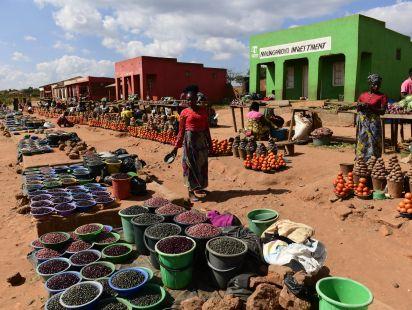Roberta Ziparo
Faculty
,
Aix-Marseille Université
, Faculté d'économie et de gestion (FEG)

- Status
- Assistant professor
- Research domain(s)
- Health economics, Development economics, Labour economics
- Thesis
- 2013, University of Namur
- Download
- CV
- Address
AMU - AMSE
5-9 Boulevard Maurice Bourdet, CS 50498
13205 Marseille Cedex 1
Nicolas Berman, Lorenzo Rotunno, Roberta Ziparo, The Economic Journal, 05/2025
Abstract
How to allocate limited resources among children is a crucial household decision, especially in developing countries where it can have strong implications for children and family survival. We provide the first large scale study linking variations in parental income in the early life of children to subsequent child health and parental investments across siblings in developing countries, using data from multiple waves of the Demographic and Health Surveys spanning 54 countries. Variations in the world prices of locally suitable crops are used as measures of local income. We find that children born in periods of higher income receive better health investments and display persistently higher levels of health than their siblings. Children whose siblings were born during favourable income periods receive less investment and exhibit worse health. These findings are consistent with a model of sibling rivalry where parents invest in the child with the highest returns and complementarities in investment across periods. We also provide evidence that other investments (education, parental time use and child labour) react to sibling rivalry. Our results suggest that income shocks can enlarge disparities within households.
Keywords
Intra-household allocations, Parental investments, Income, Health
Nina Buchmann, Pascaline Dupas, Roberta Ziparo, American Economic Review, Vol. 115, No. 2, pp. 525-570, 02/2025
Abstract
We study reputation dynamics within the household in a setting where women regularly receive transfers from their husbands for household purchases. We propose a signaling model in which wives try to maintain a good reputation in the eyes of their husbands to receive high transfers. This leads them to (i) avoid risky purchases (goods with unknown returns) and (ii) knowingly overuse low-return goods to hide bad purchase decisions—we call this the intrahousehold sunk cost effect. We present supportive evidence for the model from a series of experiments with married couples in rural Malawi.
Jean-Marie Baland, Roberta Ziparo, Oxford University Press, 11/2018
Abstract
This paper is intended to bridge the theoretical literature describing efficient intra-household behaviour and the development literature that collects empirical regularities pointing toward the existence of strategic decision-making among spouses. It examines the key elements of the collective model and discusses its relevance to analysing intra-household behaviour in poor countries. It explores the role that risk and uncertainty, information asymmetries, power imbalances, arranged marriages, strategic investment, gender norms, and extended households play in the attainment of efficiency.
Keywords
Household, Efficiency, Development, Strategic behaviour
Nava Ashraf, Erica Field, Giuditta Rusconi, Alessandra Voena, Roberta Ziparo, American Economic Review, Vol. 107, No. 5, pp. 511-515, 05/2017
Abstract
Maternal mortality remains very high in many parts of the developing world, especially in sub-Saharan Africa. While maternal deaths are observable, it may not be straightforward for individuals to learn about risk factors. This paper utilizes novel data on male and female perceptions of maternal risk in Zambia to document that superstitions about causes of maternal mortality are pervasive and to uncover evidence that such beliefs impede learning about maternal health risk levels and correlates. In our data, people who hold traditional beliefs disregard past birth complications completely in assessing future risk, unlike those who hold modern beliefs.
Jean-Marie Baland, Isabelle Bonjean, Catherine Guirkinger, Roberta Ziparo, Journal of Development Economics, Vol. 123, pp. 38--56, 11/2016
Abstract
In the absence of well-developed markets for credit and insurance, extended families play a major role as a traditional system of mutual help. However these arrangements have important consequences on economic choices. In this paper, we use first hand data from Western Cameroon to explore this question. We find that the large majority of transfers follow a given pattern whereby elder siblings support their younger siblings in the early stages of their lives who in turn reciprocate by supporting their elder siblings when they have children. We interpret this pattern as a generalised system of reciprocal credit within the extended family. We propose a simple overlapping generation model to investigate its welfare properties. We then explore the implications of this pattern on labour market outcomes and find evidence of large disincentive effects. This pattern of transfers also implies that younger siblings are more educated but have fewer and less educated children.
Keywords
Transfers, Solidarity, Mutual help, Extended families, Africa
Timothée Demont, Roberta Ziparo
Abstract
This paper studies whether expanding women’s decision-making authority within marriage affects female labor supply and girls’ human capital investment. We exploit a major reform of French marital law in 1966, which reallocated control over labor and financial decisions from husbands to wives while leaving divorce institutions unchanged. Using census and family survey data, we implement two complementary empirical strategies. First, exploiting the discontinuity in access to the new marital regime by date of marriage, we show that women married under the new regime are 7 percentage points more likely to be employed more than thirty years later, after childrearing constraints have largely passed. Second, using cohort- and gender-based exposure to the reform, we find that girls who are at key educational decision ages when the reform is announced complete more schooling and are 13 percent more likely to obtain a baccalauréat or a higher-education degree. These education gains translate into higher employment rates and access to higher-skilled occupations in adulthood.
Keywords
Gender, Education, Labor supply, Marriage law, Intra-household decision making
Renaud Bourlès, Timothée Demont, Sarah Vincent, Roberta Ziparo
Abstract
In developing countries, many policy interventions aim to enhance female entrepreneurship by giving access to cash inflows targeting women. However, important investment decisions are usually made at the household level and may be influenced by local cultural norms about female labour force participation. Using a standard collective household model, this paper studies spouses’ joint investment decisions. We show that the individual optimal investment levels are not necessarily aligned between spouses, though costly utility transfers can realign spouses’ incentives. The required transfer is increasing in the stringency of the gender norm against female labour participation, making investment potentially too costly. We test these predictions using two different empirical settings and strategies. First, we exploit original data from a field experiment in India, which gave access to new investment opportunities to women through microcredit. We find that treated women belonging to castes that are relatively more favourable to women investing are more likely to engage in home agricultural production and less likely to engage in casual low-wage jobs. Yet, they seem to enjoy lower utility levels in some dimensions such as health and freedom. To the contrary, we do not find any change in the occupation or independence of women belonging to castes that traditionally impose strong restrictions on women’s behaviour, suggesting that investment is then too costly. Second, we exploit India’s accession to the GATT in 2005 as a natural experiment and use Indian household surveys to study the effect of the termination of quotas imposed on textile exports, a female-dominated activity, on women’s well-being. We find that in districts that are more suitable for cotton growing, a feminine-oriented occupation, removing the quotas increases specialization in garments and decreases health indicators for women belonging to castes that are relatively more in favour of women working. Those empirical findings are consistent with our model, showing that, in the presence of gender norms, female entrepreneurship entails intra-household transfers that impact female well-being and can eventually prevent investment.
Keywords
Female Entrepreneurship, Gender Norms, Intra-household allocation
Nicolas Berman, Lorenzo Rotunno, Roberta Ziparo
Abstract
How to allocate limited resources among children is a crucial household decision, especially in developing countries where it might have strong implications for children and family survival. We provide the first systematic study linking variations in parental income in the early life of children to subsequent child health and parental investments across siblings in developing countries, using data from multiple waves of the Demographic and Health Surveys spanning 54 countries. Variations in the world prices of locally produced crops are used as measures of local income. We find that children born in periods of higher income receive better human capital (health and education) investments and durably enjoy better health than their siblings. Children whose siblings were born during favourable income periods receive less investment and exhibit worse health. We also provide evidence that other investments (education, fertility) react to sibling rivalry, and show that these within-households adjustments matter at the aggregate level.
Keywords
Health, Income, Parental investments, Intra-household allocations
Marie Apedo-Amah, Habiba Djebbari, Roberta Ziparo
Abstract
We test the existence of cheap talk between husbands and wives working together in a family business. Our setting is the farm household. We designed an experiment, contextualized as an input allocation game, in which the husband chooses the amount of resources to invest on his own plot and on his wife's land. The return from the land managed by the wife is higher. We experimentally vary whether the returns from the wife's plot are communicated to the husband (i) by the experimenter, (ii) by the wife herself, and (iii) by the wife herself but with the possibility for the husband to verify the accuracy of the information from the experimenter after he makes his allocation decision. Male producers allocate too few inputs to their wife's plot across all experimental conditions. We rationalize these ndings in a setting with limited enforcement of marital agreements and derive additional predictions. First, allocative ineciencies in production are worse when women hold private information compared to the full information treatment. This eect is stronger for households for which resource-sharing under full information is lower. Second, communication between spouses can only compensate for damages from private information when the information is veriable ex post.
Keywords
Household production and intra-household allocation, Non-cooperative game theory, Asymmetric and private information, Lab-in-the-field experiment, Farm households
